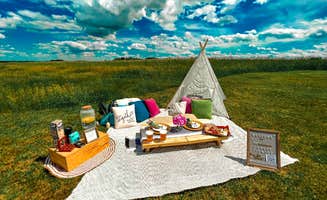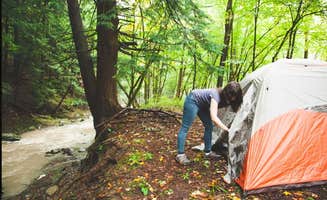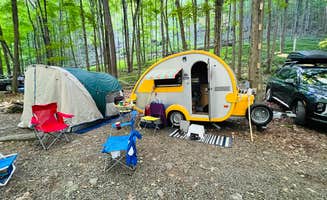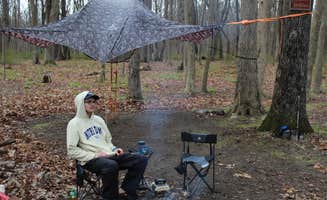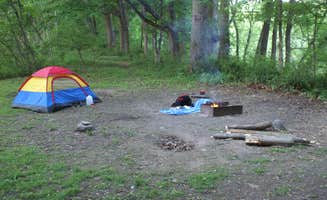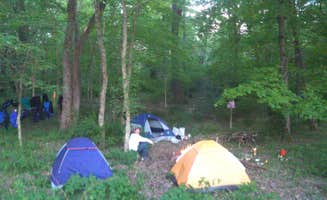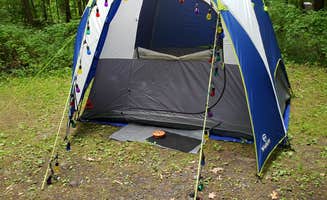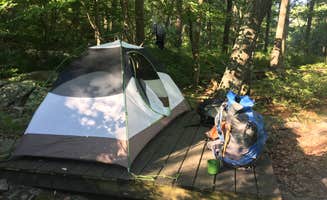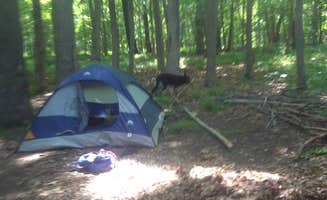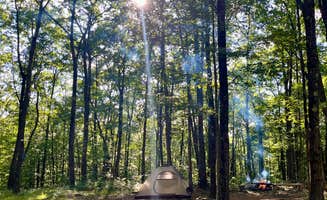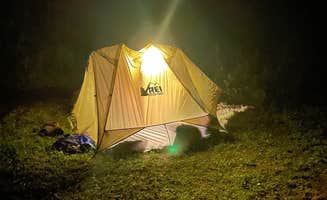Tent campsites near Honesdale, Pennsylvania are concentrated along the Delaware River watershed, with elevations ranging from 800 to 1,200 feet throughout the region. Summer temperatures typically range between 70-85°F during the day and 55-65°F at night, creating comfortable camping conditions from late spring through early fall. The area receives approximately 48 inches of annual rainfall, with thunderstorms common in summer months.
What to do
Waterfall exploration: Within a short drive or paddle from many riverside campsites, visitors can explore impressive waterfalls. From Namanock Island, "it is only a 10-15 minute hike along the road on the Pennsylvania side of the river to reach Raymondskill Falls. A 'must-see' if your stopping here," according to camper John B.
Paddling adventures: The Delaware River provides excellent opportunities for canoe and kayak trips. Sean M. notes that around Hankins, "there are a few spots where you can launch a kayak and the lakes connecting rivers/streams are very cool and jungly." Planning river travel requires attention to water levels and current strength.
Stargazing: The limited light pollution makes for exceptional night sky viewing. One camper at Namanock Island observed, "once darkness falls the absence of light sources beyond your camp remind you that you are truly alone in the wilderness," making it ideal for astronomy enthusiasts.
What campers like
Island seclusion: Many campers value the unique experience of camping on islands within the Delaware. At Namanock Island — Delaware Water Gap National Recreation Area, John B. describes, "having an entire island to yourself is a feeling I have never experienced anywhere else." Sites are well-spaced for privacy.
Wildlife viewing: The riverside locations offer excellent wildlife observation opportunities. Multiple reviewers mention seeing "tons of bald eagles flying near the site and while paddles birds playing and baby geese with their mommas" in the Delaware River corridor.
Well-designed fire pits: Several camping areas feature exceptionally well-constructed fire rings. At Oh! Pear Orchards, campers consistently mention "the best fire pits" as a standout feature that enhances the camping experience, with designs suitable for both warmth and cooking.
What you should know
Site accessibility varies significantly: Many tent sites require specific access methods. For Minisink Campground, visitors should know that certain sites are "only accessible by canoes or kayaks. There is no public road access to the campsite," which requires advance planning for equipment transport.
Limited stays at river sites: Campsites along the Delaware River often have stay limitations. One reviewer notes, "People found camping at this site that are not on a river trip or camped at the site for longer than one day can expect to receive hefty fines from the NPS."
Seasonal considerations: River camping areas change dramatically with water levels. John B. advises, "spring time trips can find the water levels much higher and swifter making it more difficult to arrive safely, or dry" at riverside campsites.
Tips for camping with families
Cart assistance for walk-in sites: Families with young children should consider campgrounds that provide equipment transport. At Oh! Pear Orchards, Heather T. mentions "there is a cart provided which made it pretty easy" for transporting gear to walk-in sites, adding that "the hosts also offer valet service to your site."
Spacious sites for group camping: For larger family groups, look for campgrounds with ample space. At Quilted Woods, the tent sites are designed to accommodate multiple tents while maintaining privacy, allowing families to spread out comfortably.
Wildlife education opportunities: The river corridor provides excellent teaching moments about local ecosystems. Campers frequently report sightings of "bald eagles," "baby geese with their mommas," and various woodland creatures, making camping trips both recreational and educational for children.
Tips from RVers
Limited RV options near the river: Most Delaware River campgrounds are tent-only. For RV camping, Second District Brew Farm provides more accessible sites with some amenities like "drinking water" and "trash" service, though hookups are limited.
Prepare for no-hookup camping: RV campers should come prepared for primitive camping experiences. Even at campgrounds that permit RVs, most offer no electric hookups, water connections, or dump stations, requiring self-contained operation and conservation of resources.
Parking considerations: Many tent camping areas that allow RVs require separate parking from the actual camping area. Visitors should contact campgrounds directly about vehicle size limitations, as most riverside camping areas cannot accommodate larger rigs on narrow access roads.


